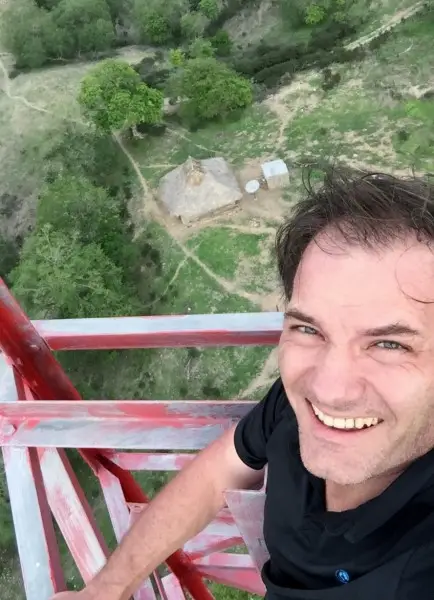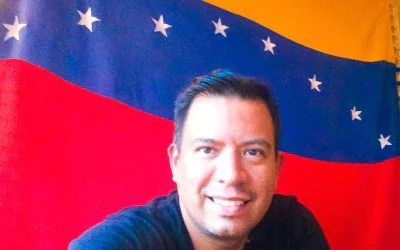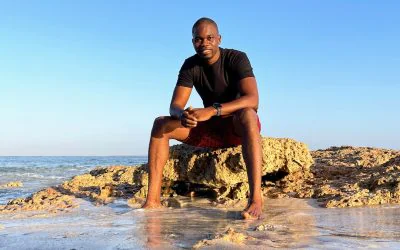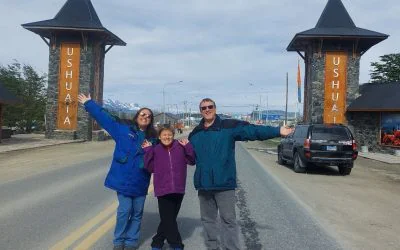Ben Dowson completed 193 by visiting the Seychelles in 2019. Starting off as a young explorer and hitch-hiker who famously made a headline in the Nebraskan McCook Gazette in 1987, who would have predicted he would end up becoming one of the UN Masters? Ben reveals how it all came to be!

Ben, tell us something about your early years in the UK and how your love for travelled developed.
I was born in Newark and grew up in a village south of Nottingham. Back in the day, both my parents’ families were definitely more “gentry” than “worker”. By the 1970s, that meant a big old family house with a large garden to run around in, but not a lot of cash. Holidays were mostly big family get-togethers somewhere on the coast, or maybe across the Channel in Brittany.
My folks were big skiers, so I and my younger sister and brother all benefitted from that. But everything was always done budget-style: long drives out to Austria and Switzerland and the like. The Dover-Calais crossing features quite large in my childhood memories.
My folks still considered private education a no-brainer, so I was sent off to boarding school in Cumbria at the age of seven. I was about three feet tall, but I had a bit more brain power than just about everyone else, so I was a bit of a target at times. I guess that experience definitely developed my sense of independence.
On the plus side, I had run up just about every hill in the Lake District and the Yorkshire Dales by the time I turned nine. Love of mountains – reinforced by both my parents – has remained with me ever since.
Both my grandfathers had travelled in their youth. My dad’s dad had taken a round-the-world trip in the 1920s – mostly by luxury liner – and he would regale me with stories while I poured over his early 1900s “Citizen’s Atlas” trying to connect the dots.
My mum’s dad had fought in Malaya and the Middle East, and was able to add in a few anecdotes of his own. But neither my mum nor my dad travelled outside the annual skiing holiday in the Alps. He’d already started a family by the time the overlanders got going in the late 60s, and he was never a hippie anyway. In the 70s, travel was expensive. I remember he did go to Riyadh once to help build some swimming pools for the Saudis. That was a major event in the family. When he and my mum were finally in a position to travel further afield, they decided on a heliskiing trip to the Canadian Rockies.
A week later, my dad was dead, at the age of 49, one of nine avalanche victims. My mum watched from the top of the slope while the entire mountain fell on top of him. But she got over it: she’s travelled extensively in fifty countries and five continents since then.
So I guess it was a combination of early road trips, pouring over atlases, and a turbocharged sense of independence that formed the basis for my love of travel. By the time I got to university I was primed to hit the road. The long summer holidays – and most of the Easter ones too – gave me ample opportunity to do so. So, off I went.
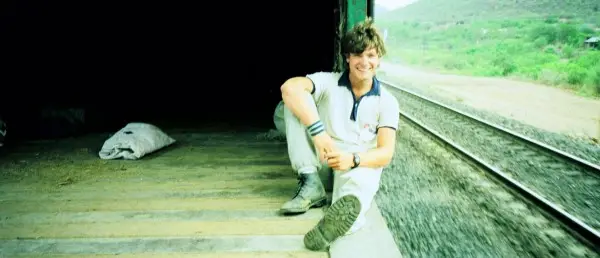
Did you feel quintessentially British initially? Has this changed over the years?
I do feel British, yes – but not “quintessentially” so. I’m not sure there is such a thing as a quintessential Brit any more. Some stereotypes remain, but there’s too much diversity in the UK these days for any of them to be really representative. But I definitely still feel my roots are in the UK, even after having lived overseas for over 30 years, and calling Indonesia my home. The ties do seem to have grown stronger recently, but I think that’s more to do with the fact that I’m planning to move back to the UK some time in the next few years, or at least spend more of my time there.
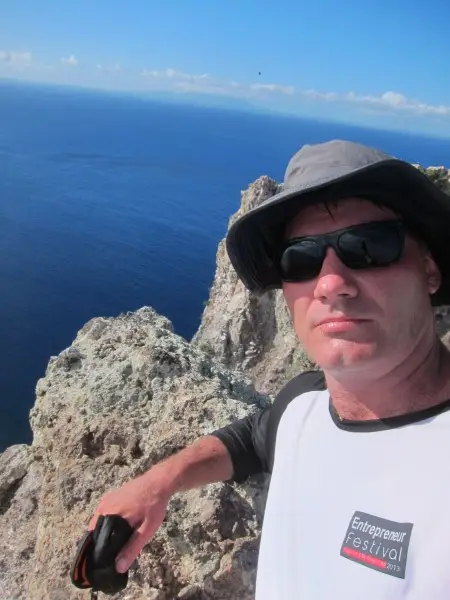
You’ve been living in Indonesia since 1991. What made you move and stay there, and what were the initial elements of culture shock you experienced?
I came to Indonesia more or less by accident. I had been on a school expedition to Malaysian Borneo in 1984, and I remember looking at the Malaysian map of the island and seeing most of it blank, with “Kalimantan” written in big letters across the empty space. We were living in the jungle close to the Indonesian border, and I remember thinking one day I’d come back and visit the other side of the line, just to see what was there.
But by the time I graduated in 1989, I was fixated on Africa, specifically Mauritania (another mostly blank space on the map). So I decided to hitch hike down there to see what was there. I ended up living in Tidjikja in the Mauritanian desert and working as a (very) ad hoc English teacher. A few months later, during the build-up to the first Gulf War, I was deemed to be a CIA spy and chased out of town. I ended up teaching in Abidjan for a while. I had been planning to spend a few years in Africa, maybe working as a journalist.
Then in March 1991 I got the news that my dad had been killed in the avalanche, so I headed back to the UK. Later that year, armed with TEFL certificate, I received offers from language schools in Majorca, Katowice, and Jakarta. Majorca seemed too close. Katowice seemed too industrial. And I remembered the promise I’d made to myself back in 1984. So I went to Indonesia on a two-year contract.
I’m still here. I didn’t plan it that way, but one thing leads to another, and that’s what happens. I ended up with a family, a house, and all the rest of it. I spent twenty years as the front man for Southeast Asia premier Blues Brothers tribute band. I was a regular country-singer guest on primetime TV. I’m Indonesia’s third-best harmonica player. And I’ve run three engineering companies, despite knowing nothing about engineering. I can’t say I have any regrets.
I can’t remember suffering any serious culture shock. I think I went through the normal amazement – euphoria – frustration – acceptance progression that most expats go through. I still occasionally get incredibly frustrated or pissed off at the nonsensical things and situations that occur on a regular basis. But more often than not, I just tend to laugh it off. I’m fond of saying that I’ve never woken up once in 30 years and thought “Today is going to be exactly like yesterday”. It’s a gross exaggeration, of course. But if you want to live in a place where you are guaranteed to never get bored, come to Indonesia.
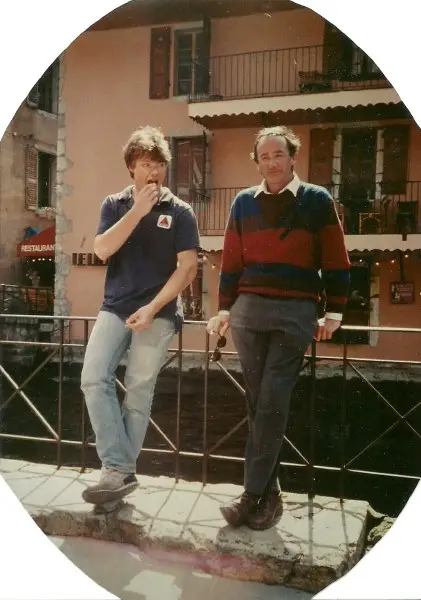
And since you are an ‘expert’ on Indonesia, give us some of the gems of the country you feel are little known, yet unmissable.
Indonesia is a huge country. I’ve been everywhere and yet feel I’ve hardly been anywhere. This summer I had a trip climbing volcanoes on Alor and Pantar, two islands between Flores and Timor. Amazing scenery and amazing people. Before that, I was in Southeast Maluku. Indonesians call these the “forgotten islands”. No one has heard of them.
They are truly fantastic. Other other-worldly places would include little-known regions like Central Sulawesi – where there is a “plain of jars” similar to the one in Laos – and most of Papua, of course. Less remote but equally stunning locations would include the likes of Sumba and Mentawai islands, with their unique cultures, Aceh, with its sharia-loving locals, and just about anywhere in the far east of Java. Plus a thousand other places even I haven’t heard of.

Tell us a little about your adventurous early travels, and how you were led to the desire to visit 193.
By the time I left school I had been to precisely three countries, thanks to our regular ski holidays (France, Switzerland, Austria) and transited three others (Belgium, Luxembourg, West Germany). I also went on holiday to Jersey (my first plane trip, in the middle of the last pandemic!) in the summer of 1968. The school expedition in 1984 was my first trip outside Europe.
On the way we stopped in Hong Kong, where Alex from “Alex Tailor” told me I was extremely handsome and he’d like to make me a tailor-made suit for only 150 quid. We climbed Mt Kinabalu – having helped to build the high-altitude climbers’ hut on its upper slopes. We spent two days in a longhouse deep in Sabah’s interior, where the chief offered our teacher the use of his wife for the night.
We trekked for a week in the Crocker Range, where we discovered and bagged new orchids for dispatch to Kew Gardens. I fell in love with the daughter of the Minister for Youth and Sport. And I celebrated my 18thbirthday at the Piasau Boat Club in Miri, Sarawak. It was all great, and it undoubtedly left me wanting to travel more.
Before heading to college, I spent a few months travelling on a round-the-world ticket. I topped up my funds with half a dozen casual jobs while on the road, mostly in Australia. Summer holidays during college were spent travelling, mostly using bucket-shop air deals from dodgy agents in Tottenham Court Road.
In summer of 1986 I inter-railed from Leicester to Istanbul and then hitched to the Iranian border and all the way back home again. In summer of 1987 my parents offered to buy me a car for 21st birthday. I told them I’d prefer a return plane ticket to DFW, and I spent the summer hitching around the western half of the US, and riding the freight trains in Mexico. In summer of 1988 I flew to Delhi on Ariana Afghan airlines for 200 quid return.
That trip took me up the Karakoram highway (which had opened two years previously) into China. I caught giardia in Hunza and spent a week in Kashgar as sick as a dog before taking the three-day bus journey to Dunhuang, and then another two days to Lhasa hiding from the checkpoints under the floorboards because Tibet was off limits to foreigners that year. After graduating, while all my mates had lined up lucrative city jobs, I spent a few months working behind a bar in Melton Mowbray until I had enough cash to hitch to Mauritania.
When I first moved to Indonesia in 1991, I had been to forty-four countries. Over the next decade I managed to double that figure. I think it was when I reached 100 countries in 2002 that I decided to visit them all.
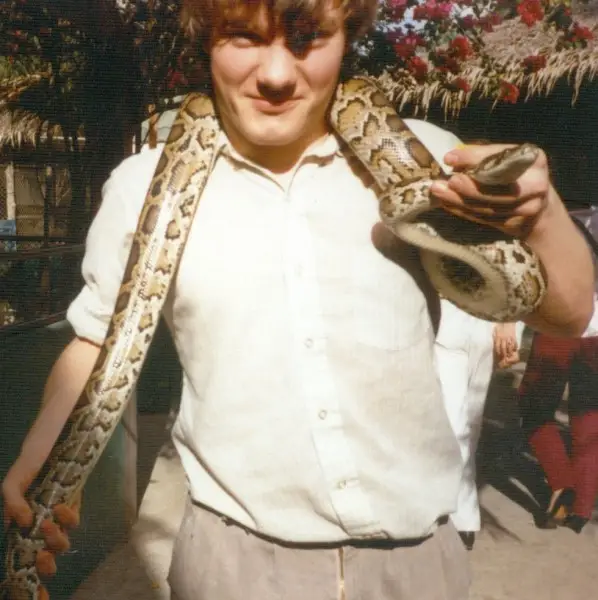
How has your travel style changed, if at all, over the years? And what about covid, how has that affected your travels?
In the early years I travelled as a student does, camping or staying in hostels, and hitch-hiking wherever possible. Over the years I added public transport, mid-range hotels and even rental cars into the mix. More recently I have splashed out the big bucks for group tours to “difficult” locations, but only when it has been necessary to do so.
I don’t do group travel unless I have to, but that said, the group trips I’ve joined since 2017 – to Saudi Arabia, Chad, Sudan and Yemen, as well as some smaller trips with a few travel mates – have been among my most memorable. Plus of course, I’ve met a lot of like-minded friends whom I look forward to travelling with in the future.
A few years ago, my daughters asked me if they could come with me to one of my “new” countries. I said, how about coming with me to my final one? They liked this idea, so I made a plan to complete the 193 in December 2019 in the Seychelles. I’m glad they were there, and I’m doubly glad I finished the challenge before covid set in. I did manage a lot of travel in 2020, though. I was in the US in June and July, helping Charles Veley test drive his Tesla around the Pacific Northwest before riding Greyhounds and Amtraks through the Mid-West.
I spent two months in Europe in the autumn. I was in the UK in October and managed to visit various offshore islands that were new to me. In January this year I was in East Africa, where I finally managed to climb Mt Kenya. Unfortunately I tested positive for covid the day before I was due to fly home. I doubtless caught it riding crowded matatus in “covid-free” Tanzania. I ended up spending a total of 17 days in quarantine, first in Nairobi and then in Jakarta.
Like most people, I was completely asymptomatic – despite having been diagnosed with a something called “organizing pneumonia” last year. Personally I think the global reaction to the pandemic has been massively and stupidly overblown. Everyone knows that only the very old or the sick are at risk. Governments would have been better advised to spend their cash isolating the vulnerable instead of locking down the whole population and trashing their economies.
Anyway, Indonesia doesn’t do lockdowns. In developing countries, people who don’t work tend to die of starvation. But there ismandatory quarantine in place for inbound travellers. That is the biggest drawback to overseas travel. And it’s clear that my girls and I won’t be heading to the UK for their summer holiday this year – again.
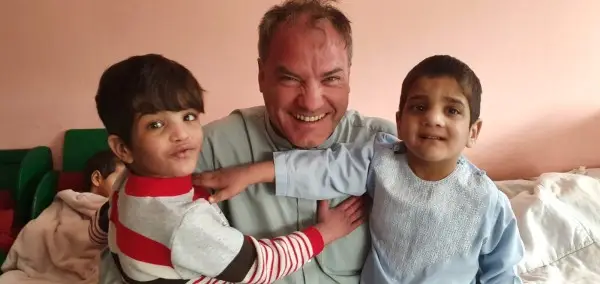
Give us a couple of travel stories that really stand out.
My best – and weirdest – stories tend to have come from hitch-hiking and from Africa. On my Spring 2015 trip (which included 19 days’ sailing across the Atlantic) I had a bit of both. First I flew to Dakar Senegal, and headed out to Goree Island. On the way back to Dakar I met a guy on the boat who invited me to stay, and ended up in his top-floor bedsit smoking joints with about half a dozen other guys.
Around midnight a girl appeared out of nowhere, and sat down next to me. I thought nothing of it, and carried on getting stoned. Next thing I knew I was waking up naked with the girl on top of me. Luckily, even in my unsober state I thought it better to extricate myself rather than “push on”. In 1990 I’d lost my virginity going unprotected with a girl called Susie from Sierra Leone in the Hotel Delphine in Conakry.
It traumatized me for a decade. I didn’t want another decade of trauma. So I decided to extricate myself rather than proceed to the end game. In the morning I asked my new friend “What that was all about?” He said I’d been talking about my divorce and seemed a bit depressed, so he figured he’d try to cheer me up!
A couple of months later I had reached LA and was ready wind up my trip and head home. But I couldn’t help wondering whether I could recreate my glorious summer of ’87 hitching around the western US. So I embarked on a cross-country hitch-hike from Globe, Arizona to Killington, Vermont. It wasn’t easy.
Mostly I was mistaken for a bum, arrested by cops, spent an uncomfortable night sleeping in a doorway in Clines Corners, New Mexico, and narrowly avoided getting raped by an old guy called Mac in Florence, Alabama. But I still got to spend a weekend on the Martinez ranch in McClean, Texas drinking moonshine and shooting crossbows, plus a night just off the Nachez Trace Parkway in the trailer of an old lady called Paula, whose husband was an East End gangster who ran around with the Cray brothers.
It was good to know that hitch-hiking could still create magic moments. I will never stop hitch-hiking. And I will never stop travelling in Africa.

You are quite well-known in the major travel clubs and have met most of the ‘regulars’. What do you find they have in common, if anything?
Well, obviously the main thing they have in common is an obsession with travel. In most cases, I think, that points to common attributes such as curiosity, a thirst for knowledge, the thrill of discovering new things, or simply the love of the open road. Actually we are a fairly disparate bunch.
That is good: it means that each of us can find like-minded people within the wider travel community, and make new friends. Obviously we tend to get together (and travel) with those people whom we get on with. And even if in other circumstances we would be unlikely to be friends, it is the underlying, basic common interest that binds even unusual bedfellows together. We are all dromomanic hodophiles at heart.
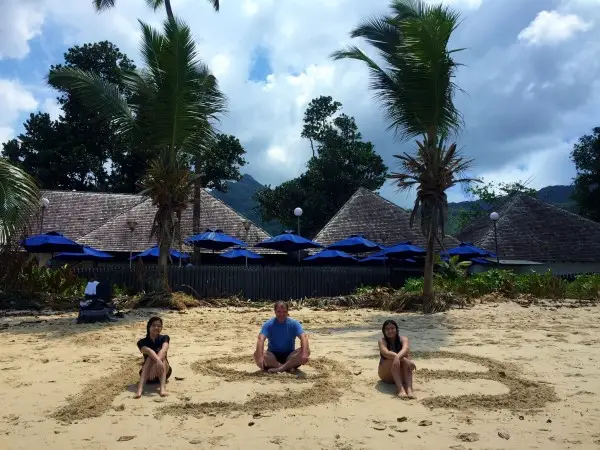
Despite being active socially, you are generally absent from social media, and don’t have a blog. Why is that?
No, I don’t have a blog. What would I blog about? And I hate the concept of Facebook. I have no interest in sharing my every waking moment with hundreds of people I hardly know. And (generally speaking) I have little interest in checking out what other people I hardly know are doing. I do have an FB account, though. Michael Runkel forced me to make one so he could make a “Chad Trip” travel group in FB Messenger. I signed up as Jenny Johnson.
When we met up in Ndjamena, one of our group had bought Christmas goody bags for each of us. She’d bought a girly goody bag for Jenny, of course. It was much better than the boys’ bag! Last year I had to change it to my real name, to avoid further confusion when expressing my interest in Maurizio Giuliano’s trip to BIOT. But I’m not an active user. I do have an Instagram account, where I usually post a photo every few days when travelling.
I like Instagram because you end up with a pictorial record of key moments in chronological order. I also do it for my mum’s sake. I got an email from her in mid-2017 saying “Where are you?” I emailed her back, “You know where I am; I’m in Brazil.” She then emailed, “You haven’t posted anything on Instagram for a week. Are you OK?” I told her, “Mum, when I was 18, I walked down the drive and disappeared to Tibet for three months without any word, and you never batted an eyelid.
Now I’m 51, and you’re worried because you haven’t heard from me for….. a week??” She said, quite reasonably, “They didn’t have the technology back then.” I also have a YouTube account where I post the odd video. My video of Chad has recently gained traction. My “Timor Leste Road Trips” has been widely watched. And my video of Kiribati video seems to have become the “go to” video for travellers researching Kiribati.

You are divorced. Do you think your travels may have had something to do with this? In general, do you feel most world travellers tend to have to sacrifice a ‘normal’ family life to achieve their travel ambitions?
Most “world travellers”, by which I assume you mean high-ranking NomadMania types who by and large live for their next trip with the same level of addiction that a chain smoker lives for his next cigarette – do not have “normal” family lives, by which I mean mum, dad, a couple of kids, and a family dog named Rover. Take a look at the top 100 NM travellers: lots of singles, retirees and divorcees, a few childless couples.
We know of one or two who do have young families, though, and we know how hard those guys work to balance travel and family life. Invariably they have very supportive spouses, who more often than not share their passion for travel.
Personally speaking, I didn’t travel so much while I was married. I was also working a regular job most of the time. My wife ran off with her boss, after (according to her, at any rate) many years of soul searching. Not much you can do about that. So I never figured that my tendency to prefer to holiday in Turkmenistan rather than take a family trip to see the cousins in Sumatra had much to do with it.
My wife used to tell me I could go travelling wherever I liked as long as it wasn’t to some place that she wanted to visit too – in which case she would come with me. But I was chatting to a group of students in Kenya earlier this year, and when I told them I was divorced (having previously mentioned my 193 achievement) one of them said “Duh… of course you’re divorced.
What did you expect?” It’s true that I wasn’t around for my family as much as I would have been if I hadn’t spent quite so much time in the Pamirs or Pohnpei or Pyongyang. To a greater or lesser extent. we always reap what we sow.
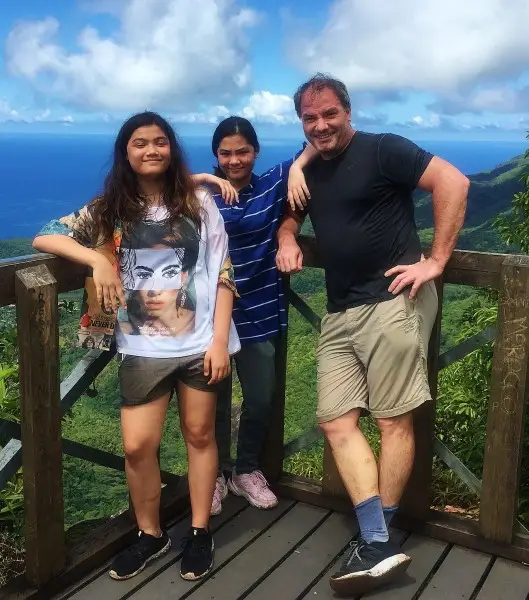
What aspects of NomadMania do you like most, and why?
I like NomadMania’s clean and clear-cut division of the world into the 1301 regions. Thanks to the huge amount of work that has gone into it, this regional division now seems very coherent and balanced. Each region has a wealth of information attached to it. I use NomadMania to see where I haven’t been, and plan trips around those regions.
So, what are you up to nowadays?
While I was travelling in Nicaragua in August my brother called me to ask whether I’d be interested to go to Russia to check 5000 speed cameras. Naturally I said yes, so right now I’m driving around the western oblasts as a traffic-camera “surveyor”. I’m almost done, but I must have done a reasonable job, because they want to keep me on for longer. In the longer term, I’m waiting to start managing a project in Mindanao, but as it’s been pending for over two years now I’m not holding my breath.
Opportunities for expats in Indonesia have fallen off a cliff, so if the Philippines doesn’t work out, I’ll probably move back to the UK – after 30 years of living overseas. My daughters will be starting uni soon, either in UK or on the continent, so a UK move would work well. Everything is up in the air: I’ll just wait and see what lands on the table. Worst case, I have the traffic cameras. I’m an experienced traffic-camera surveyor now!
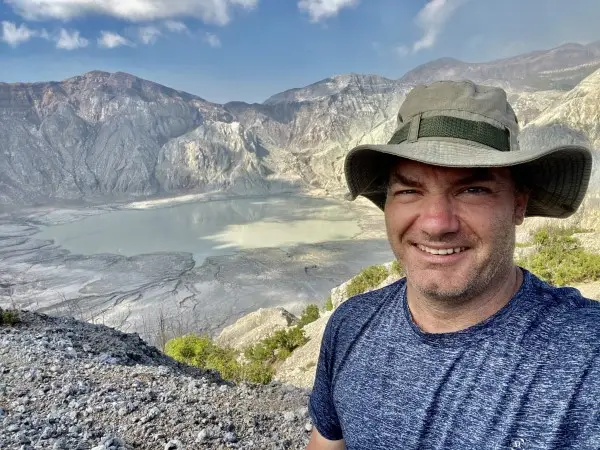
And finally our signature question – if you could invite 4 people from any era to dinner, who would your guests be and why?
That’s very easy to answer. I’ve met Willie Nelson, and I’ve had tea with the Queen. I cannot think of any other famous people I’d want to have dinner with. So I would invite my dad, my two daughters, and one of my four nieces and nephews. They’d have to draw lots to see which one got the last spot. My dad died before he got the chance to meet any of his grandchildren, so it would be a lively dinner party. My dad also predicted the invention of the iPod 20 years before its creation. I’d like to get the chance to tell him he was right.
